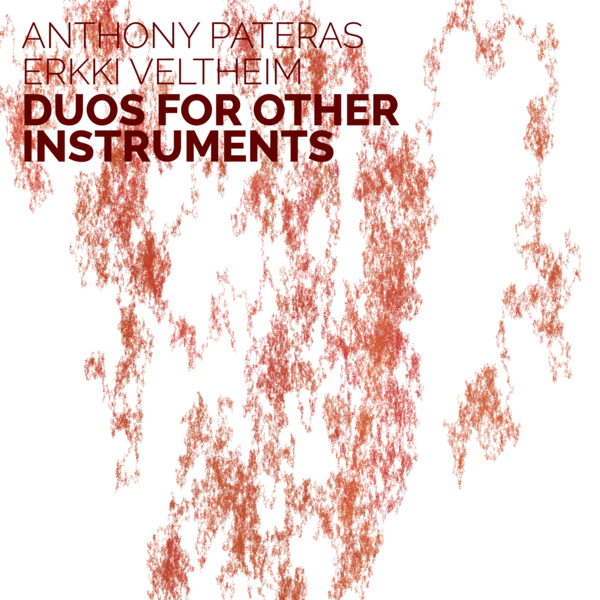
Anthony Pateras
Erkki Veltheim
Duos for Other Instruments
Anthony Pateras
Erkki Veltheim
atd11
A sense of communication beyond the frame can be felt in the collaborations between Anthony Pateras and Erkki Veltheim. Their practice as a duo concentrates their shared interest in experiencing the materiality of music; of the way sounds become music and how that music can come to feel to be a tangible force.
Critical acclaim
Duos for Other Instruments bevat twee stukken. In Ersatz maakt Veltheim repetitieve bewegingen, terwijl Pateras een indringende klankwolk produceert en in Golden Point is het evenzeer een aaneenschakeling van minuscule patronen. In beide gevallen met een drone tot gevolg die gedurende het gehele stuk als een hardnekkig lage drukgebied blijft hangen. Klank, pure klank, dat is waar het om gaat.
Tracks
| 1 | Ersatz for viola and celeste | 19:10 |
| 2 | Golden Point for harpsichord and mandolin | 23:05 |
| TT | 42:15 |
Thanks to John McCaughey and Gabrielle Baker.
Liner notes
There are moments in the films of Werner Herzog where a conversation stops and the camera lingers on the interlocutors, a little too long for comfort. Something may be revealed about the characters in those awkward passages. Perhaps more importantly, something is revealed about the fiction of cinema and the multiple dimensions of art. What is worth observing and what is not? Does looking long enough, hard enough, at something make it art on its own terms?
A comparable sense of communication beyond the frame can be felt in the collaborations between Anthony Pateras and Erkki Veltheim. Over the past twenty years they have worked together in various composer-performer ensembles based in Melbourne. Their practice as a duo concentrates their shared interest in experiencing the materiality of music; of the way sounds become music and how that music can come to feel to be a tangible force.
With Pateras playing keyboards and Veltheim on strings, they explore the way the instruments sound, both in terms of how they work and their resultant timbre. The plucking action of harpsichord and mandolin determines the novel sound-world of Golden Point, while the sympathetic combination of celeste and viola lends a mellow, dulcet tone to Ersatz. These are, in some ways, secondary instruments for both performers, substituting their more familiar violin and piano — hence the title Ersatz, testing the notion of what seems authentic and what fake. Though Golden Point is named after a favourite swimming location of Pateras’s, this is not music about images. If anything, it is about perception: about the shifting continuum of composition, improvisation, performance and listening; about the phenomenology of time and space.
Pateras and Veltheim resist expectations of structure and dramaturgy in these duos through extremes of repetition and duration. Changes are felt, beneath the sonic surface and in the body, but cannot be predicted and are rarely experienced at the same spot again. The materials are minimal and the improvisatory processes yield their potential. This is not minimalism as style, but minimalist content. Indeed, one description Pateras and Veltheim give of their duos is that they are a kind of ‘musica povera’. This admits the poverty of material but also conveys that this is music that is generated by the energy of being in certain spaces. The music is by and for the performers; it does not need an audience to complete the circuit. Yet others can be brought into its trance-like ecstasy: heard live, the duos can make time stand still or speed up; listened to as a recording, on headphones or sitting in a room, multiple possibilities open up according to the acoustics of the surrounding environment.
This is music that demands full attention in order that it can absorb you into its patterns. Give it time and details can leap out, or the process of repetition itself becomes meditative. As with Herzog’s lingering camera, Pateras and Veltheim’s duos question how we listen: what we notice and what passes by.
Laura Tunbridge